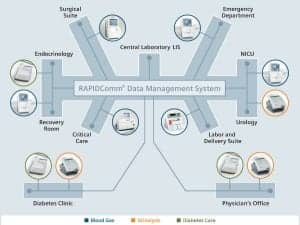A new survey found that more than a quarter of clinical lab professionals—representing a variety of labs and associated organizations—indicated that their laboratory information system (LIS) had gaps in its ability to meet their testing needs.
The survey, XIFIN’s “State of the Industry: Laboratory Information Systems” study explores labs’ satisfaction with laboratory information systems provided by 18 different technology vendors plus homegrown solutions. Approximately 30% of respondents indicated their laboratory information system lacked proper testing abilities.
The study also investigated LIS reliability, scalability, security, and interoperability. With very little research currently available into satisfaction levels of laboratory information systems, this report provides valuable insights into the realities of what labs think about their own LIS, including:
- Opportunities for Satisfaction Improvement: Nearly one quarter of respondents indicated they are unsatisfied (18%) or highly unsatisfied (5%) with their organization’s current LIS.
- Approximately a third of respondents indicated dissatisfaction with their LIS’s ability to meet their testing needs, a significant issue in today’s environment.
- More than a quarter stated some level of dissatisfaction with their LIS’s management reports. Overall, respondents were less satisfied with their LIS management reports than the LIS patient reports.
- System Security Awareness and Obsolescence Concerns: Nearly one quarter of respondents reported being unsure about the security of their organization’s LIS (22%) or that it has known security vulnerabilities (2%), a significant concern due to the value of healthcare data.
- Additionally, more than 40% of respondents indicated that their organization’s LIS was either not operating on the most recent software version (18%) or that they didn’t know if they were on the current version (24%). This opens the lab up to both functionality and security issues.
“Labs are increasingly adopting cloud-based solutions because testing menus are constantly changing, and they need to manage shifting capacity and other operational needs as market disruption continues,” says Joe Nollar, AVP LIS Product Development, XIFIN. “Ensuring these diagnostic organizations have the ability to individualize their workflow and merge multiple lab locations into a single, unified LIS using a trusted vendor and a secure, functional, and interoperable platform is key to their successful evolution.”
Anecdotally, many labs across the U.S. build their own laboratory information system or are continuing to use an on-premise system—not taking advantage of the many benefits of a cloud-based LIS, such as collaboration, scalability, and automated software updates. Additionally, as the industry consolidates, many labs are facing the daunting task of unifying varying lab locations.
“Our team provides laboratory testing services for a wide range of specialties and have an aggressive growth strategy, which includes providing lab services to partner lab sites,” says Michael Lorenzo, chief operating officer, Pathline. “By using XIFIN’s LIS platform, we are able to provide a unique LIS instance to each lab partner on a single platform, which enables us to unify our operations and workflow, and our patient and management reporting.”
The “State of the Industry: Laboratory Information Systems” survey was fielded in 2021 and included nearly 100 individuals representing laboratories across the United States to gather information such as LIS satisfaction, reliability, scalability, security, and interoperability.
Respondents represented a variety of labs and associated organizations including anatomic pathology, clinical pathology, molecular diagnostics, reference laboratories, genomics laboratories, hospital outreach laboratories, pain/toxicology labs, and biopharma.
Featured image: XIFIN’s “State of the Industry: Laboratory Information Systems” study explores labs’ satisfaction with laboratory information systems provided by 18 different technology vendors plus homegrown solutions. Photo: Business Wire





